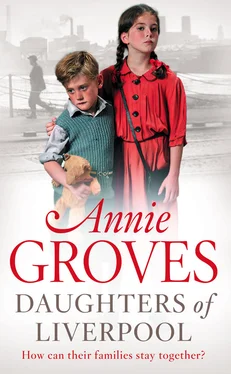Katie might not have a ‘voice’ but she did have a good ‘ear’ – and, so she was pleased to think, a good awareness of how wearying artistic temperament could be, especially to those on the receiving end of it.
Katie treated her inability to sing as philosophically as she treated the quarrels between her parents – what else after all could she do?
‘Yes, Katie, your father is right,’ her mother had told her. ‘You can’t possibly go to Liverpool.’
‘I have to,’ Katie had told them both, patiently explaining that it was her duty, but diplomatically not explaining how she had slipped the all-important consent form under her father’s nose when he had been signing some business letters she had typed for him.
She had seen the job advertisement in one of the London papers, asking for young women with ‘some specialist knowledge’ on a list of subjects that had included music, and had written off before she could change her mind.
She had been so excited when she had received a reply requiring her to present herself at the address given in the letter for a formal interview.
It had seemed such a grown-up and important thing to do when she had had it explained to her that because of her knowledge of popular music the Government wanted her to work in Liverpool for MC5, the ‘secret’ organisation where letters to and from certain countries were censored and checked for hidden messages. The fact that she could speak and write a small amount of French and Italian was apparently an added bonus. The stern-looking official who had interviewed her had told her that spies were very clever in the ways in which they made contact with one another, often using devices such as mentioning in their letters something as seemingly innocent as popular music, their references a code containing secret information. Her task would be to read such letters and look for anything within them that seemed suspicious.
She would be working alongside other girls, she had been told, and under a supervisor, to whom she would be able to refer any letter that might arouse her suspicions.
She had felt so proud and pleased with herself when she had been offered the job but now, after nearly eight hours on a train that had seemed to crawl from London to Liverpool, she was beginning to wonder if her parents had been right and she had done something very silly indeed.
Now that she was in Liverpool, instead of feeling relieved Katie was actually beginning to feel slightly shaky and uncertain. If she had stayed at home she would have been accompanying her father tonight to the well-known London hotel where one of the bands he conducted would be playing. Instead of having merely a semi-stale cheese sandwich to eat, she would have been able to look forward to a delicious supper from the hotel restaurant.
Now that she was through the ticket barrier Katie put down her case in order to get her bearings, and then almost lost it in the surge of people milling around her.
As she reached to retrieve it, a young man in RAF uniform beat her to it, handing it to her, giving her a wink and a smug grin as he did so.
‘That will cost you a kiss,’ he told her cheekily.
‘Then you’d better put it back,’ Katie replied sharply, ‘because you won’t be getting one.’
He looked as shocked as though a kitten had suddenly shown the teeth of a tiger, but Katie was unrepentant. Give his type an inch and they’d try to take a mile. Well, not with her, they wouldn’t. People – men – thought that just because she was small and dainty-looking that she was a pushover. Well, she wasn’t, and she wasn’t going to be either.
Picking up the case the airman had put down, Katie turned her back on him and made her way towards the exit.
‘Will ’Itler be bombing Liverpool again before Christmas? Read all about it,’ the newspaper vendor outside the station bawled.
Katie stared at the headlines. She didn’t really know very much at all about Liverpool or about it being bombed. She’d been too busy soothing her parents’ fears about their ability to manage without her to worry about any bombs.
‘What’s up, love?’ the news vendor asked her.
‘Oh, nothing …’
‘If it’s directions you’re wanting then you’d better go and ask at the WVS post back there in the station,’ he told her. ‘They’ll probably give you a cup of tea an’ all …’
It was good advice. She knew that she had been billeted with a Mrs Jean Campion in somewhere called Wavertree, but she had no idea just where that was, other than that it was close to the place where she would be working, which was apparently off a road named Edge Lane.
The women in charge of the WVS post were every bit as helpful as the news vendor had promised, although there was no tea.
‘We’ve run out,’ the plump grey-haired woman standing beside the tea urn apologised to Katie. ‘I dare say your landlady at your billet will have something nice and hot waiting for you, though. It’s the bottom end of Wavertree you’re wanting, just over the border with Edge Hill. You can take the bus or even walk it, although walking will take you a good half an hour or so, and uphill as well,’ she told Katie informatively.
Katie thanked her.
* * *
It was dark and cold, and the Liverpool night air smelled alien. Katie had walked past the Royal Court Theatre just as the stage door was opening to admit a group of chorus girls smelling faintly of greasepaint, sweat and that once known never forgotten smell of dusty dressing rooms, excitement and nerves that she always associated with her mother, even though the only visits her parent now made to theatre dressing rooms were to see old friends from her own stage days.
That wasn’t homesickness she was feeling, was it, because if it was then it had better be on its way, Katie told herself stoutly as she wrapped her long scarf more tightly around her neck and marched determinedly past the theatre.
The WVS had given her the number of the bus she would need and the name of the stop to ask for to get off. There was quite a queue already waiting at the stop, young women mostly chattering away in an accent that Katie’s acute ear quickly had her mimicking inside her head.
She gathered from their conversation that they were shop girls on their way home from work. They sounded jolly, their conversation mixed with lots of laughter. Katie hoped that the people she would be working with were as pleasant.
She had been told that the exact nature of her work would be explained to her once she had presented herself at her place of work. She had been given the name of the person she was to report to tomorrow morning and had been warned that she was not to discuss the nature of her work with anyone.
The bus arrived, disgorging some passengers before taking others on. By the time Katie got on there was only one seat left, but when she saw the heavily pregnant and not very young woman getting on behind her Katie offered it to her and was rewarded with a tired smile, and a grateful, ‘Ta, love. Gawd, but me legs are aching. Never thought I’d see meself in this condition again at my time of life, but there you go. Got me like this before he went off to war, my Bert did, and now he’s living the life of Riley in some army camp and I’m here like this.’
Katie listened politely. The people of Liverpool weren’t so very different from their neighbours in London, by the sound of it, for all that they spoke with a very different accent.
‘Here’s your stop, love,’ the conductor eventually warned her as the bus started to slow down.
Picking up her case, Katie thanked her and stepped down onto the platform.
The blackout made it impossible for her to see anything of her surroundings as she followed the WVS lady’s instructions and crossed the road, shining her torch to find the opening to the street she wanted, before heading down it.
Читать дальше












